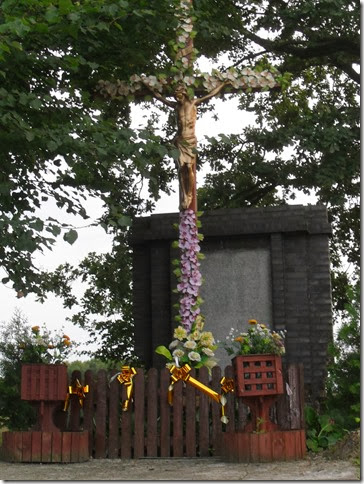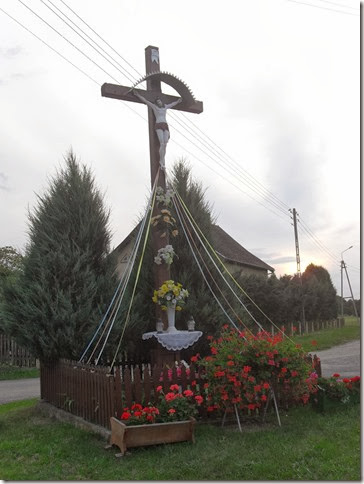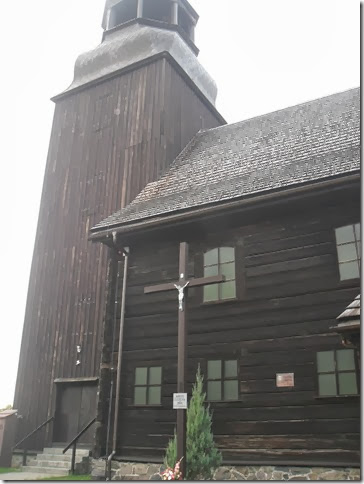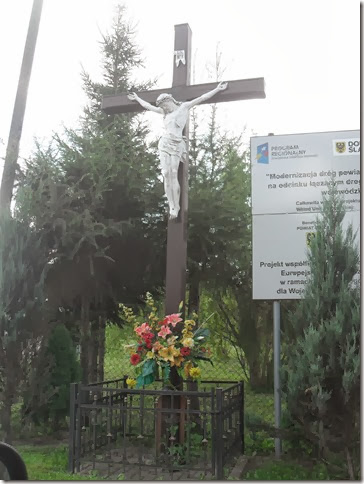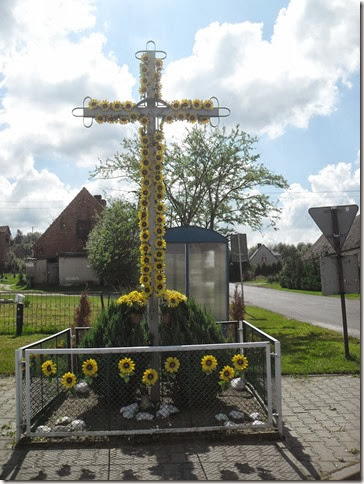
Some time ago I started my adventure with reading whole books in Polish. I read a lot of newspapers in Polish but I had avoided whole books until just this summer. My first attempt was
Wypędzone. It was a good choice as a first book for me. It wasn’t too difficult to read and I was interested in the subject matter enough to push through even with my language problems.
I decided to read
Sołdat from the same series as my next book. I know it is kind of heavy on the WWII history. The book is heavy but at the same time insightful and informative. I had never read anything about WWII from the perspective of a Red Army soldier so that alone was enough to catch my interest. That and the total szacun I got from other people on the beach as I read it.

After that I watched the documentary entitled “
900 Dni - Oblężenie Leningradu” (worth watching)and I finished off with the book
Bij w werbel i nie lękaj się wspomnienia - Maria hrabina von Maltzan. It’s a very interesting book and Misiu described the life of the duchess as zajebiste. Her life was amazing and eventful, but I wouldn’t want to have as zajebisea a life as hers. I also shed a tear as she described saying good-bye to her favorite chestnut trees from her family’s palace. I know this place well and those trees are still there. It’s not the most harrowing event of her life but it was touching for me.
I’m a peculiar person, I know.
So from
Wypędzone I was able to learn 20 new ways to describe getting raped, here in
Sołdat I was able to learn an amazing number of ways to say flaki. Oh and ziemianka which I kept reading as ziemniaka.
This in the introduction of the book Sołdat, the memoir of Nikołaj Nikulin, is what made me decide to tackle this book despite the difficult subject matter and difficult language for me, Polish.
Wojenne zwycięstwa i heroizm są powszechnie znane, przez wielu były opiewane. Lecz w oficjalnych zapisach nie ma prawdziwej atmosfery wojny. Ich autorów prawie nie interesuje, co naprawdę przeżywa żołnierz. Zazwyczaj wojny wszczynali ci, którym zagrażały one najmniej: feudałowie, królowie, ministrowie, politycy, finansiści i generałowie. W ciszy gabinetów układali plany, a potem, kiedy już wszystko było skończone, pisali wspomnienia, podkreślając swoje męstwo i usprawiedliwiając porażki.
Większość pamiętników opiewa samą ideę wojny, stwarzając tym samym przesłanki dla nowych planów wojennych. Zaś płacą za to wszystko ci, co giną od kuli, realizując plany generałów. Ci, którym wojna jest absolutnie niepotrzebna – pamiętników nie piszą.
Victory in war and heroism are commonly known and have been praised by many. But in the official records, there is no authentic atmosphere of war. The authors almost take no interest in what the soldiers actually experienced. Typically, war was launched by those it least threatened: feudal lords, kings, ministers, politicians, bankers and generals. In the quiet of their offices they drew up plans, and then, when everything was over, wrote memoirs, highlighting their bravery and justifying their failures.
Most diaries celebrate the very idea of war, thereby creating the conditions for new war plans. And to pay for all those who die from a bullet, carrying out the plans of generals. Those to whom war is absolutely useless, do not write memoirs.
You can’t get through this book without reading about death, useless, senseless death. Death is everywhere in this book. It’s a war memoir. Death is unavoidable.
Tak więc stosunek zabitych: jeden do dziesięciu lub nawet więcej – na korzyść przegranych. Ten rachunek prześladuje mnie ciągle jak najgorszy koszmar.
Czyżby nie dało się inaczej? Przecież tyle środków przeznaczano na armię przed wojną. Teraz nawet nie ukrywa się faktu, że na początku wojny nasze siły były wystarczające, by pokonać wroga.
Po upływie wielu lat oceniam, że inaczej być nie mogło, ponieważ ta wojna różniła się od wszystkich naszych poprzednich wojen nie sposobem jej prowadzenia, a jedynie rozmachem. Uwidoczniła się nasza cecha narodowa: wykonywać wszystko maksymalnie źle przy maksymalnej utracie sił I środków.
Thus, the ratio of dead: one to ten or even more - in favor of the losers. This account of affairs still haunts me like the worst nightmare.
Could it have been otherwise? After all, so many resources were allocated to the army before the war. Now, the fact is not even hidden that at the beginning of the war our forces were sufficient to defeat the enemy.
After the passing of many years, my evaluation is that it could not have been otherwise because this war was different from all our previous wars, not in the way it was conducted but by its momentum. It only served to highlight our national character: to do everything as badly as we can with a maximum loss of forces and resources.
And because hindsight is always 20/20:
Czasem w pamiętnikach generałów czytamy: “Jeśli zrobiono by tak, a nie tak, jeśli posłuchano by mnie, wszystko poszłoby inaczej…” Co by było gdyby! Czasem winią Stalina albo inny ludzi.
Sometimes we read in the memoirs of generals: “If it had been done like this and not like that, if they had listened to me, things would have gone differently…” What would have been! Sometimes they blamed Stalin, sometimes other people.
In describing the attitude to people and to life:
Pewnego razu podsłuchałem rozmowę komisarza z dowódcą batalionu strzeleckiego, który w tym czasie toczył walkę. Ta rozmowa wyrażała istotę rzeczy: Powalczymy jeszcze dzionek, dwa, dobijemy resztę I pojedziemy na tyły na przegrupowanie. Wtedy dopiero się zabawimy!
Once I overheard a conversation between our Commissioner and a shooting battalion commander, who was fighting a battle at the time. This conversation expressed the essence of the matter: “We will fight a day or two, kill off the rest and go to the back to regroup. Then we’ll have some fun!
Killing off the rest is in reference not to the enemy, but to their own soldiers. Killing off meant allowing the enemy to kill them, but what’s the difference to you the lowly soldier of the front line?
Zresztą, wojna zawsze była podłością, a armia – instrumentem zabójstwa. Nie ma wojen sprawiedliwych, wszystko one są – mimo różnych uzasadnień – nieludzkie. Żołnierze zaś zawsze byli nawozem. Zwłaszcza w naszym wielkim mocarstwie i szczególnie w czasach socjalizmu.
Besides, war has always been vile, and the army – an instrument of killing. There are no righteous wars, all of them are - despite various justifications - inhuman. Soldiers have always been fertilizer. Especially in our big superpower and especially in times of socialism.
“Ludzie to pył. Naprzód!” “People are dust. Forward!” quote of general who was told his approach was a death wish for his division.
The author frankly cannot hide his disgust at journalists and other good for nothings who stayed at the back and profited from the death on the front line. He resents how they tell their stories and collect their medals.
Pogrzebią szlachetną pamięć o tych, którzy naprawdę walczyli i zginęli. Wojnę, o której sami wiedzą niewiele, przedstawią w romantycznej aureoli. To, że wojna oznacza strach, śmierć, głód, nikczemność – odejdzie na drugi plan.
They bury the noble memory of those who actually fought and died. The war, of which they know little, they present with a romantic aura. The fact that war is fear, death, hunger, wretchedness – comes in second place.
About injuries and survival:
Ludzie, którzy naprawdę walczyli na wojnie, bezwarunkowo powinni albo zginąć, albo trafić do szpitala. Nie wierzcie tym, którzy mówią, że przeszli całą wojnę bez jednej rany. To znaczy, że albo wałęsali się na tyłach, albo sterczeli przy sztabie.
Mnie ratowało od śmierci nie tylko szczęście, ale – głównie – odniesienie rany. W krytycznych momentach pomagały mi uciec spod kul. Ranienie – byle nie w brzuch i nie w głowę, bo równało się to śmierci – było szczęśliwą okolicznością! Idziesz na tyły, tam cię myją, przebierają, kładą na czystym prześcieradło, karmią, poją….O zranieniu żołnierze marzyli jak o urlopie. O lekkim.
People who actually fought in the war should unconditionally either die or end up in hospital. Don’t believe those who say that they passed through the war without a single wound. This means that they were either loitering at the back or waiting it out at the headquarters.
I was rescued from death, not only by luck, but - mainly – from getting wounded. In critical moments, that helped me escape the bullets. Getting wounded – just not in the stomach and not in the head because it meant death - was a happy circumstance! You went to the back, where you were washed, dressed, put on a clean sheet, fed, and watered...Soldiers dreamed of getting wounded like dreaming about a vacation. Slightly wounded that is.
But don’t even think about injuring yourself on purpose. For that they shot you in the head.
And now to get the perspective of the Russian aggressors described by the German women in the previous book:
As the Russian army crossed over into German territory…
Teraz wojna pokazała jeszcze jedno – zaskakujące dla mnie – oblicze. Wydawałoby się, że doświadczyłem wszystkiego: śmierci, głodu, ostrzałów, pracy ponad siły, zimna. Otóż nie! Było coś straszniejszego, co mnie dobiło ostatecznie. W przeddzień wejścia na terytorium Rzeszy do oddziałów frontowych przyjechali agitatorzy. Niektórzy wysokiej rangi.
-Śmierć za śmierć!!! Krew za krew!!! Nie zapomnimy!!! Nie wybaczymy!!! Pomścimy!!!
I staliśmy się tacy sami, jak naziści. Co prawda, tamci rozrabiali planowo: utworzyli gett, obozów, stworzyli protokoły i zestawienia zagrabionego majątki, rejestr kar, planowe egzekucje i tak dalej. U nas poszło po słowiańsku, żywiołowo. Bijcie, chłopaki, palcie, głuszcie! Marnujcie ich kobiety! Oprócz tego przed ofensywą sowicie zaopatrzono wojska w wódkę. I poszliśmy.
Now the war showed me one more surprising face. It would seem that I had experienced everything: death, starvation, shellings, exhaustion, cold. But no! There was something terrible, which eventually “killed” me. On the eve of entering the territory of the Reich, agitators arrived to the front. Some were high ranking.
-Death for death! Blood for blood! Do not forget! Do not forgive! Revenge!
And we became the same as the Nazis. In truth, they did their damage following a plan: they created ghettos, camps, created records and statements, seized possessions, recorded penalties, planned executions and so on. We did our damage the Slavic way, spontaneously. Beat you guys, burn, smother! Ruin their women! In addition, before the offensive, the army was provided with ample supplies of vodka. And so we went.
As the war comes to an end, the author made it from Leningrad to Berlin.
Kontakty z sojusznikami były nikłe. Przeszkadzała bariera językowa i powściągliwość Anglików, którzy patrzyli na nas z góry. Amerykanie byli bardziej bezpośredni, zwłaszcza Murzyni, którzy z nami sympatyzowali.
Contacts with the Allies were slim. The language barrier interfered as well as the reserved nature of the English, who looked down on us. Americans were more direct, especially black Americans, who sympathized with us.
He goes on to describe an amusing situation in which a drunk Russian soldier stopped a German on his bike, hit the German in the ear, stole his bike and went on his way. The German complained to the English and they recovered his bike. Later a black American soldier got that bike from the German and handed it over to the Russian with a friendly slap on the back (for the Russian) and another punch to the ear for the German.
While that story is sad yet mildly amusing, the next is not.
W Berlinie widziałem, jak Amerykanin pobił śmiertelnie swojego rodaka – Murzyna. Bił go bestialsko, podkutymi butami kopał w brzuch, w twarz. Wszystko to nie wzbudzało sympatii do sojuszników.
In Berlin I saw an American beat his black compatriot to death. He beat him so savagely, with his spiked shoes he kicked him in the stomach, in the face. All this did not arouse sympathy for the allies.
I chose these few remarks from the book to give you a taste, however, the book consists of much more. The author includes his war story, the stories of others, anecdotes both humorous and tragic, his reactions and later reflections of what went on. Sometimes I got lost in the chronology as I think the author did as well in 1975 when he finally decided to put his story down in writing. I also got lost in my Polish occasionally mixing up active and passive tense as I do. I am fortunate enough to know war only from books and documentaries. I hope it stays that way.


